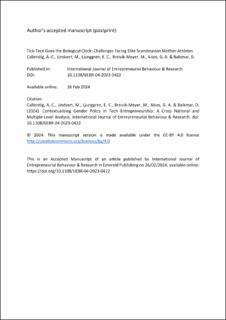Contextualizing Gender Policy in Tech Entrepreneurship: A Cross National and Multiple-Level Analysis
Callerstig, Anne-Charlott; Lindvert, Marta; Ljunggren, Elisabet Carine; Breivik-Meyer, Marit; Alsos, Gry Agnete; Balkmar, Dag
Peer reviewed, Journal article
Accepted version
Permanent lenke
https://hdl.handle.net/11250/3123987Utgivelsesdato
2024Metadata
Vis full innførselSamlinger
Originalversjon
Callerstig, A.-C., Lindvert, M., Ljunggren, E. C., Breivik-Meyer, M., Alsos, G. A. & Balkmar, D. (2024). Contextualizing Gender Policy in Tech Entrepreneurship: A Cross National and Multiple-Level Analysis. International Journal of Entrepreneurial Behaviour & Research. doi: 10.1108/IJEBR-04-2023-0422Sammendrag
Purpose In order to address the gender divide in technology entrepreneurship, we explore how different national contexts impact policies and policy implementation. We investigate how transnational concerns (macro level) about women’s low participation in (technology) entrepreneurship are translated and implemented among actors at the meso level (technology incubators) and understood at the micro level (women tech entrepreneurs). Design/methodology/approach We adopt gender institutionalism as a theoretical lens to understand what happens in the implementation of gender equality goals in technology entrepreneurship policy. We apply Gains and Lowndes’ (2014) conceptual framework to investigate the gendered character and effects of institutional formation. Four countries represent different levels of gender equality: high (Norway & Sweden), medium (Ireland) and low (Israel). An initial policy document analysis provide the macro-level understanding (Heilbrunn et al., 2022). At the meso level, managers of technology business incubators (n=3-5) in each country were interviewed. At the micro level, 10 female technology entrepreneurs in each country were interviewed. We use an inductive research approach, combined with thematic analysis. Findings Policies differ across the four countries, ranging from women-centred approaches to gender mainstreaming. Macro-level policies are interpreted and implemented in different ways among actors at the meso level, who tend to act in line with given national policies. Actors at the micro level often understand gender equality in ways that reflect their national policies. However, women in all four countries share similar struggles with work-life balance and gendered expectations in relation to family responsibilities.

